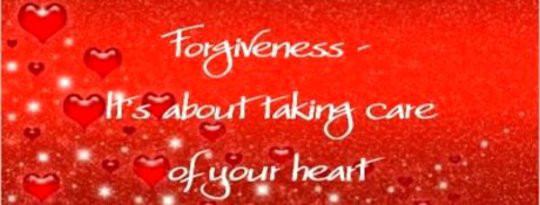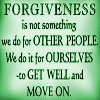
After I was told by my surgeon that he thought I had about thirty days to live, I was put in touch with an exceptional cancer survivor who kept prodding me to examine the issue of forgiveness. Her name was Colleen and she was convinced that healing and forgiveness are inextricably linked. After weeks of resistance, I took her counsel to heart.
My father and I had a toxic and tumultuous relationship. The only communication we had when I was a youngster was his profanity-laced epithets criticizing literally everything I did or did not do.
Colleen’s repeated warnings about unforgiveness led me face-to-face with my deeply buried anger toward my father. After some extended reflection, I came to see him as a product of his own abusive alcoholic father. And my father was plagued with his own demons, spending time in a mental hospital.
In a way, he didn’t have a chance; he simply didn’t know any better. And once I comprehended that fact, I was finally able to release, let go, and forgive.
Get The Latest By Email
Forgiveness As A Way Of Life: Getting Well and Staying Well
Today I share Colleen’s belief that forgiveness is essential to getting well and staying well. Unless there is a healing of our mind and our spirit, any healing of the body is incomplete, and we are likely doomed.
You may say, “Greg, you don’t understand. Forgiveness in my case is just too difficult. The past is simply too horrific. People hurt me beyond forgiveness. My hostility is justified. I will not let it go.”
When we embrace that attitude, the only person we are hurting is ourselves. Unforgiveness is like a red-hot coal we hold in the palm of our hand. We are the only person it is burning. Let’s be clear: We’re not forgiving for the other person’s benefit. We’re forgiving for our own benefit, releasing the toxic poison that contaminates our life.
In as gentle and sensitive a spirit as I can communicate, I am asking you to search your heart for any sign of unforgiveness. You’ll very likely find somebody, or a whole list of people, who has done you wrong. If so, you will help in your healing by releasing thoughts of resentment, recrimination, or remorse.
I believe forgiveness, when it actually becomes a way of thinking and living, is the single most powerful key to a healed life. Forgiveness is a trusted technique by which our thoughts and perceptions are changed, transforming the harmful effects of toxic emotions into the healing reality of compassion, even love. Forgiveness allows us to switch our focus from fear to love; it helps us change what can be changed and allows us to make peace with the rest — a profound dimension of healing.
Self-Forgiveness: Releasing Self-Blame, Judgment, Shame
Just as important as forgiving others is being self-forgiving. Let’s be honest, we often hold much resentment and shame against ourselves. We judge ourselves harshly, “I’m so stupid. I’m fat. I’m ugly. I’m not worthy. I probably deserve this illness.”
I observe so many cancer patients carrying self-concepts of unworthiness. These are false and deadly beliefs. Yes, we may have done something undesirable, but that is our behavior and does not equate with being an unworthy person. Release those feelings of shame.
There’s also judgment. Judgmental behavior tears at the fabric of relationships and kindles the fires of resentment. Cancer is, among other things, an opportunity to learn and practice the difference between acceptance and approval and thus to transcend judgment.
Practicing Acceptance
 I urge you to practice acceptance. All of us have imperfect natures. All of us exhibit behaviors that don’t match our potential. Forgiveness allows us to accept imperfection without having to approve of it.
I urge you to practice acceptance. All of us have imperfect natures. All of us exhibit behaviors that don’t match our potential. Forgiveness allows us to accept imperfection without having to approve of it.
Forgiveness is experienced on two levels. The first is the most obvious. There is an event: We are wronged or we perceive an attack. That behavior needs to be forgiven. When we can say, “I forgive myself for _______,” or “I forgive ______ (another) for ______,” then we have embarked upon the forgiveness journey.
The second level of forgiveness changes our perception of what happened. Yes, an event occurred. But the real problem starts when we begin to judge what happened, when we label ourselves or the other person as bad, hurtful, mean, stupid, or another unkind attribute. We judge, even condemn.
The alternative? Acceptance. Accept ourselves. Accept others. Accept that life happens. It’s part of being human. Forgive and accept. It is a far better way to live.
If Not Now, Then When?
People who are, or believe themselves to be, near death often come to the realization that forgiveness heals. Feuds, differences, and deep hurts suddenly seem less important at this time.
The amazing payoff of forgiveness is that so many people do get well after letting go. Lives are certainly made better; many are made longer. But it strikes me that if one is willing to forgive during the last moments of life, why not do it earlier? Like right now?
How often do we need to forgive? Always. Don’t drag the memories of past hurts and mistakes into your present moments. Nothing from the past is important enough to allow it to pollute our present. Let go of judgment. Nurture compassion. You deserve it. You’ll change your life — forever!
Forgiveness was the absolute turning point in my own cancer recovery journey. I can trace the exact time of regaining my physical strength and emotional well-being to an intense week of sincerely forgiving others and myself. And from that point forward, I have attempted to make forgiveness a way of life.
How about you? Might forgiveness have a place in your journey?
An Essential Thing You Can Do
Choose just one hurt and forgive everyone concerned with it. Say out loud, with complete sincerity, “(Name), I totally and completely forgive you. I release you to the care of God. I affirm your highest good.” And in the same way, forgive yourself.
Feel the warmth of forgiveness. This next week, choose one person to forgive each day.
Reprinted with permission of the publisher, Conari Press,
an imprint of Red Wheel/Weiser, LLC. www.redwheelweiser.com.
©2011 by Greg Anderson. All rights reserved.
This article was adapted with permission from the book:
Breast Cancer: 50 Essential Things You Can Do
by Greg Anderson.
 Cancer-survivor Greg Anderson, offers critical information about the major issues patients face following a breast cancer diagnosis, and shows how to implement a comprehensive recovery plan that maximizes opportunity for healing and recovery. This is a fully integrative approach--one that questions Western medicine's tendency to overtreat and proposes a combination of nutrition, exercise, mind/body approaches, and social support along with conventional medical care.
Cancer-survivor Greg Anderson, offers critical information about the major issues patients face following a breast cancer diagnosis, and shows how to implement a comprehensive recovery plan that maximizes opportunity for healing and recovery. This is a fully integrative approach--one that questions Western medicine's tendency to overtreat and proposes a combination of nutrition, exercise, mind/body approaches, and social support along with conventional medical care.
Click here for more info and/or to order this book on Amazon.
About the Author
 Greg Anderson is a recognized pioneer in the field of integrated cancer care, and founder and CEO of Cancer Recovery Foundation International, a global affiliation of national charities now operating in the US, Canada, the UK, France, Germany, and Australia. Visit him at: www.CancerRecovery.org
Greg Anderson is a recognized pioneer in the field of integrated cancer care, and founder and CEO of Cancer Recovery Foundation International, a global affiliation of national charities now operating in the US, Canada, the UK, France, Germany, and Australia. Visit him at: www.CancerRecovery.org







